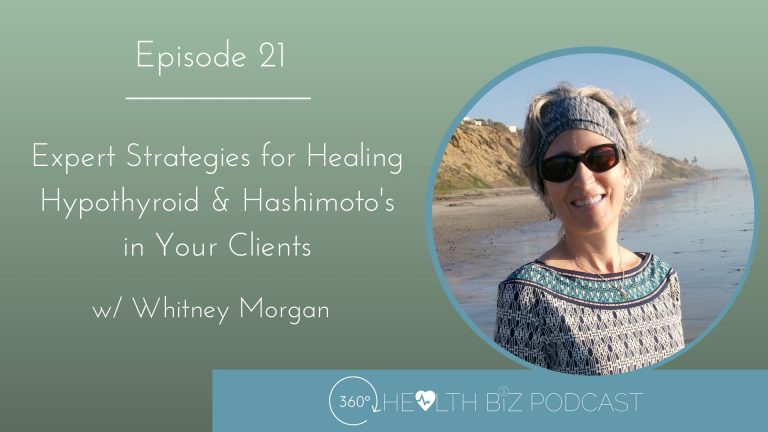WATCH THE EPISODE
LISTEN TO THE EPISODE
Vitamin D supplementation is trendy. There is more and more research telling you that chronic illness, cancer and autoimmunity is highly associated with Vitamin D deficiency.
Physicians are making the move to recommend high doses of Vitamin D supplements to everyone, even children as young as newborns. Is high dose vitamin D supplementation safe? Is it something you need to do to be healthy? Are blood tests for Vitamin D levels reliable?
In this episode, I discuss the effects of Vitamin D on the other minerals and Vitamin levels in the body. I outline the effects of Vitamin D supplementation on your thyroid gland, your adrenals, your magnesium, potassium and calcium levels.
We will go through the type of blood testing that is typically done to assess Vitamin D status and how it might not actually identify a true vitamin D deficiency. We will also discuss the best ways to support true vitamin D deficiency in terms of supplementation and safe sunlight exposure.
Grab your FREE Endless Energy Checklist to get my top 5 non-negotiable strategies for eliminating fatigue: https://go.kendraperry.net/energy-checklist
Join my ground-breaking HIGH on Energy Program for Women: https://go.kendraperry.net/high-energy
Like this episode? Screen shot it right now and share it to your Instagram Stories! Tag @kperrynutrition and I’ll share it to my stories!
Say hi on Social:
http://facebook.com/kperrynutrition
http://instagram.com/kperrynutrition
TRANSCRIPT
Hey guys! How’s it going? Welcome to another episode of High on Energy TV on Facebook Live and the podcast on High on Energy podcast. So I’ve got my little kitty friend with me right now, I love cats, I’m actually cat sitting right now. Hopefully, she won’t be too crazy, she goes between totally loving me and wanting to scratch my fucking face off. So we’ll see how it goes. Hopefully, I won’t have to kick her out.
But I hope you guys are doing good. Sorry, I’m running a little bit late today for you Facebook live people, I’m having a lot of technical issues today for some reason. So I’m streaming in through a way that I don’t ever normally stream because all of my streaming software into Facebook would not work, so I’m having one of those crazy technology glitches but that’s totally okay. Guys, if you’re on with me live right now, we’ve got a few of you coming on now. Say hey, say how’s it going because today we are going to dive into a vitamin D supplementation, which I actually have a lot of opinions about.
Surprise, surprise, I have an option about something. We’re gonna be diving into this today. Sharon’s on right now and she’s very glad that we’re talking about vitamin D. Guys, so if you can’t join me on Facebook live, if you’re not into watching video. This episode will go out as a podcast on the High on Energy podcast. Guys, you can subscribe on iTunes, Spotify, GooglePlay, pretty much wherever you listen to your podcast and that way you won’t miss an episode and you can take me on your walk with you, if that’s what you prefer. That’s definitely how I like to do things. I’m a podcast person not a video person.
Awesome guys, so again if you’re with me right now shoot me a comment, let me know you’re here. I love interacting with you, and as always I’m very happy to answer your questions. Okay, so I want to talk a little bit about vitamin D and whether it’s something you should actually be supplementing with, because pretty much in like mainstream health news what you’re being told is that you should take very high levels of vitamin D, that it’s anti-cancer, it’s anti-auto immune. And I know over in Europe, in certain European countries they prescribe very high doses of vitamin D to babies and children, like right off the bat.
Like they’re coming into the world and they’re putting them on these high doses of vitamin D. Is that actually a good strategy? Is improving your vitamin D levels through vitamin D supplementation actually something you should do? Is it actually something that’s worth spending your money on? So I’m going to address that today.
So before we jump into it guys, let’s talk a little bit about what vitamin D is and why we should care. So vitamin D is in that group of fat soluble vitamins. So your fat soluble vitamins are Vitamin A, Vitamin E, oh my gosh kitty. Vitamin K and then of course vitamin D. Okay, so they’re fat soluble meaning that in order for them to be absorbed, okay kitty, I’ve got to throw away the kitty. I love her but she’s scratching and biting me.
Okay, so with vitamin D in order to absorb those vitamins they actually need to be adsorbed in a fat medium. That’s why they’re called a fat soluble vitamin. And one of their main roles in the body is actually to increase the intestinal absorption of calcium, magnesium and phosphate and it also has many other biological facts.
The other interesting thing about vitamin D is it kind of has this dual relationship. Simultaneously, it is a vitamin, it’s vitamin D. But it’s also actually a pro hormone, so it has hormonal effects in the body, it’s actually considered a hormone. So because of that, I think the most important thing to keep in mind when taking vitamin D is that it’s going to affect your hormones. It’s going to affect your sex hormones. So, in men it might boost testosterone, but in women it may raise estrogen. Now, maybe that’s a good thing depending on what you have going on, but it is really important to keep in mind that vitamin D does have an effect on all the other hormones in the body.
And I would say a lot of the research, a lot of the big headlines you see in health news have to do with that vitamin D autoimmune connection. So there’s a lot of research that will show you that people with chronic illness, people with cancer, people with autoimmune disease have really low levels of vitamin D. I think that’s really interesting, I think it’s really interesting that low vitamin D tends to go with this chronic illness. But does that actually mean that vitamin D is a cause? So I think when we see things like that, where we’re like “Okay, vitamin D is associated with chronic illness, with cancer, with autoimmune issues. So I need to get my vitamin D levels tested and I need to take as much vitamin D as possible because it’s going to prevent me from having these issues.”
But that actually might not be the case, just because there’s a connection between something doesn’t mean there’s a causal factor. This is like the biggest thing with research that drives me crazy and the way that the news actually portrays that research, is they will say have crazy things in their headline that actually elude to the fact that there’s some sort of causal mechanistic thing going on. When really it’s actually just an association and just because two things are correlated doesn’t mean they cause each other.
This is a big thing with like those population settings, and a lot of the big headlines you see in the media for this research has a lot to do with population settings. So it’s like, people look at a population, so they look at a population of people and they say, “Okay, in this population these people tend to have a lower intake of iodine, and they also have a higher incidence of thyroid cancer,” or something like that, right? So those things are connected according to the population study. You have that sorry the cat is distracting me, she’s like in a bag right now. Totally ruining my train of thought, I should have kicked her out, but I just think she’s so cute.
Anyways, so basically like those things have some sort of relationship. This low iodine is somehow connected to thyroid cancer but it doesn’t mean that low iodine causes thyroid cancer. It just means that they’re connected in some way and I think that’s really interesting. Interesting. It’s something that maybe we need to dig in deeper, but there is nothing in that study that actually indicates a causal mechanism.
We need to actually see deeper studies where we actually research whether there is a mechanistic or a causal factor going on. This is the big thing that drives me crazy about the media, is like they’ll just … a study like that will come out that will be some population study or epidemiological study that connects low iodine to thyroid cancer. But how it will be portrayed, the headline will be something like, “Low iodine causes thyroid cancer according to recent study.” It’s very misleading and I think a lot of people will just look at the headline, maybe they’ll dig a little bit into the article but they actually don’t go into that actual study like most people don’t actually know how to read research studies and why would they?
It’s pretty boring, it’s pretty technical but when you actually go look at the methods and how that study was actually done, that’s how you can actually determine if there was actually something causal or something mechanistic that was actually studied, in a lot of the cases there isn’t. That’s me off on a tangent, but what was done was actually a review. So there was a review done on the research that connects vitamin D to autoimmune disease, for example. A review is basically just when they look at all the research available and see what it’s all saying and kind of like analyze it and say, “Based off of all the research available, this is where things are pointing, this where they’re not pointing, this is maybe something we need to look into further.”
A review was actually released that was looking at vitamin D deficiency in regards to autoimmune disease and what they found was that low levels of vitamin D in patients with autoimmune disease may be a result rather than an actual cause of that autoimmune disease and maybe even supplementing with vitamin D may actually exacerbate that autoimmune condition.
So I think that’s really interesting. Boy kitty. So and I think with a lot of that stuff, this is actually what’s going on. Yes, people with autoimmune disease tend to have lower levels of vitamin D, but it doesn’t mean that low levels of vitamin D are actually causing that autoimmune condition. I actually am not a fan of supplementing with vitamin D and I actually don’t recommend it with anyone I work with and this is why. Because vitamin D is a vitamin, so not only is it a pro hormone, it’s a hormone that affects other hormones but it’s actually a vitamin that affects our minerals. vitamin D has a really unique effect on the minerals in the body, so it will actually raise calcium by increasing the intestinal absorption of calcium.
The other thing it does is it depletes the intestinal absorption of Potassium. This a big deal. First of all, 80% of people out there actually have issues with their calcium, they actually have too much calcium in the body. The reason why you wouldn’t want too much calcium in the body because the higher the calcium gets in the body the more it slows the thyroid. And the other thing about calcium is it’s not the smartest mineral, and when it’s in the body without all its posses, so without proper levels of other mineral and vitamins, it tends to end up in the wrong place and it tends to build up in the soft tissue.
So when I do mineral testing, generally what I’m seeing is a lot of soft tissue calcification. This just calcium building up everywhere, where it doesn’t belong. So 99% of calcium actually does belong in the bone and the teeth and that’s where you want it to be. But when you have this soft tissue calcification situation going on the calcium can’t get into the bone in the teeth and the Potassium will affect that. If you have low Potassium, very hard to get calcium into the bone and then it ends up building up in the soft tissue.
So that could be the joints, the organs, that could be the kidneys, that could be the muscles, that could be the brain. And calcium is relatively sharp, so it does cause a lot of aggravation. Bone spurs are a really good example of soft tissue calcification. Now, when you have soft tissue calcification, that is sort of aging at its finest because it makes you stiffer, it causes a lot of pain, a lot of tension, achiness, stiffness, even migraines and that’s a big reason why people who are in their end of life stage, so elderly people, that’s why they are stiff and don’t move well and are achy and have a lot of pain, aren’t very flexible because they have soft tissue calcification because that’s what actually happens when you age.
Now vitamin D can exacerbate that, but of course if we have vitamin D in proper levels in the body, that’s actually not going to happen. What does it mean for someone who already has that issue with calcium happening, and like I said I run hundreds of mineral panels and seeing it in like 80% of people. What happens when there’s already a calcium issue and then people actually start to take, in my opinion, extremely high levels of vitamin D. They’re taking 5,000 IUs, they’re taking 10,000 IUs, they’re taking 20 or 30. I’ve seen people prescribed as many as 50,000 IUs of vitamin D, like that is significant. That is a shit ton of vitamin D, okay?
I think it can be a big mistake and basically, so I’m going to dig in, I’m going to get a bit nerdy about mineral testing for a second here. But basically with mineral testing we see one of two patterns, we see a slow oxidizer versus a fast. 40 years ago, it was about 50/50 split, now it’s about 80% slow. Most people are in slow pattern and people who are in a slow metabolic pattern have elevated calcium and low Potassium, and that’s what vitamin D will exacerbate.
So it actually can make that situation worse. Now, if you’re in that 20% who are fast oxidizers, which is significantly more rare these days, potentially vitamin D could help you but I’ve actually seen vitamin D to cause a lot of issues with mineral balancing. So I don’t actually think that we are meant to take vitamin D3 on its own without the proper co-factors, without the K2, without all the other things that helps the vitamin D get to where it needs to go orally.
The biggest thing, so maybe what you’re thinking here right now is that, “Okay, well, I got my vitamin D levels tested and I’m low,” so that’s why I’m taking vitamin D. I’ve actually confirmed it with testing.” So, this is an issue because what you’re getting tested for 25 hydroxy vitamin D is actually the storage form of vitamin D. It’s not actually the active form. You can go Google that right now and that’s exactly what you’ll find.
So, how can we fully assess vitamin D levels and conclude that someone has vitamin D deficiency if we are only looking at the storage form of vitamin D? What does having low vitamin D storage actually mean? So I don’t actually totally know the answer to this question. I’ll be totally honest with you, but here are some thoughts in my head. So I would think if you are someone with chronic illness, if you have an autoimmunity, cancer, some other sort of chronic illness and you have low vitamin D storage, could it be that your body is just moving that vitamin D out of storage into an active form in order for you to, oh kitty, just wants to be near me …
In order for you to actually utilize that vitamin D and have that anti sort of cancer anti-autoimmune affect. Could it be that your body is actually trying to use vitamin D so therefore your storage levels are going down? The other thought I have in my head is, “Well, what about people who live in a northern climate?” We know that one of the primary ways that we get vitamin D is actually from the sun. That is probably the best way that we can get vitamin D, is from UV light. Now, what happens if you’re like me and you live in Canada and you spend six months out of the year with the sun so low on the horizon that you don’t actually absorb the vitamin D? Well, depending on when you test, could it just be that your body is pulling vitamin D out of storage and activating it because it’s March, for example, right now, or I guess it’s April now, and it’s actually using up those vitamin D stores to support your vitamin D levels through the winter while we are not getting expose to vitamin D.
These are definitely thoughts in my head. So let me know if this resonates with you. Let me know if you’re on with me on Facebook live. Let me know if you have any questions about this, because these are definitely things that I have in my head when I think about this. If you want to get a full entire picture, if you want to see that bigger picture of your vitamin D you really should be testing the storage forms along with the active form of vitamin D. Now, you can get this tested. I actually just sent in my blood work last week and I actually got tested for this. You just need to request it.
Now, is a conventional doctor gonna want to test for this or even allow it? I would say there is a pretty good chance not, but I ordered my stuff from a naturopathic doctor, so I pay for it out of pocket.
The form you want to actually get tested for is the 125 Dihydroxycholecalciferol, so it’s a very kind of [inaudible 00:18:05] word, but if you’re wondering can you repeat that, just Google active form of vitamin D and you’ll see that it will be the first thing that comes up. So I think if we are going to be supplementing, you’re planning to supplement with high doses of vitamin D. I think first of all you need to look at the storage and the active form. Second of all, you really need to try to be getting that vitamin D from sunlight.
I really don’t think that we are meant to take vitamin D supplements in high doses of vitamin D by itself. Because vitamin D by itself doesn’t actually exist in any food form. Probably the best place to get it from a food perspective is fermented cod liver oil, I really love the stuff from Green Pasture. That’s how a lot of traditional cultures actually supplemented for vitamin D in the winter. Now, if you get enough sunlight in the summer months, you spent enough time outside, you should actually have more than enough vitamin D levels to last the winter.
Now, there is a lot of research that shows if you do have autoimmune disease and you have low vitamin D supplementing it can actually exacerbate the autoimmune disease. I do believe if you have a lot of these mineral imbalances, then taking vitamin D may not actually be a very good idea. It may actually be very counterproductive. The biggest reason why a lot of us are vitamin D deficient is actually due to mal-illumination. So mal-illumination is a thing, it’s just like malnutrition, it’s because a lot of us aren’t getting enough light.
A lot of us are spending all of our time indoors and we’re not actually spending a lot of time out in the sunshine, and then on top of that there has been an excessive amount of fear mongering from the media, from conventional medicine telling us that the sun will give us cancer. Now, I’m not telling you to go out there and burn, and burn your skin off and peel and have that experience. I’m telling you to get unfiltered sunlight in the amount that your skin tone needs.
So that’s going to vary depending on the person. So if you have very fair skin, if you’re like my boyfriend, he’s a ginger. He literally probably needs like 10 to 15 minutes maybe 20 of unfiltered sunlight every single day. That’s it. That’s the big advantage about having a lighter skin tone, is you don’t need much to get the necessary UV light that you need on a regular basis.
Me, personally I have Italian heritage so I actually have to spend a fair amount of time in the sun. I need to probably get like 30 minutes daily of unfiltered sunlight. Overall, I don’t actually think that, that is that much. Obviously, it depends on the weather, it depends on the clouds that sort of thing. But if you can spend that amount of time outside then you should technically get enough vitamin D. Now, if you’re not because you have a chronic illness and your body is not actually utilizing vitamin D properly, you may need to supplement with something like fermented cod liver oil or even better you can purchase a vitamin D light.
Now these aren’t cheap, I recommend the Sperti, I’ll actually put that in the comments so you guys know what I’m talking about. But there are a lot of them on the market but that is the only one I’ve found so far that I think is actually a good one. It is a higher price point but if you are someone who suffers with seasonal affective disorder or chronically low vitamin D levels, then that actually might be a good option. You only need to use it for about five minutes every few days to get that vitamin D levels.
The other thing to keep in mind is in order for vitamin D to be activated your body needs to have enough magnesium. Magnesium is one of the most common mineral deficiencies. So I actually believe that not only is true vitamin D deficiency due to mal-illumination but I also believe it’s due to magnesium deficiency. People are burning out their magnesium with stress, because people aren’t absorbing it properly because they have poor adrenal, poor thyroid function. All these things in the body can affect magnesium. If you don’t have proper levels of magnesium then you’re not gonna actually be able to activate vitamin D.
So I really think that instead of focusing so much on vitamin D supplementation, we should really be considering magnesium, we should be considering our exposure to sun and how much sun we’re actually getting.
So Jamie says, “Are you saying there are no situations where we should take vitamin D in supplemental form?” So I would probably only take it as fermented cod liver oil in a food based form. If you are gonna take vitamin D3 on its own, I probably wouldn’t be taking more than a few hundred International Units. I really don’t think it’s a good strategy, I’ve seen it cause a lot of issues in mineral balancing, I’ve seen it exacerbate weight issues, thyroid issues, mood issues, fibromyalgia, I’ve seen it be a big issue and a lot of my colleagues who work with mineral balancing see it to be a big issue as well.
So I really don’t recommend it in almost any case. I really don’t think it’s helpful, I think it’s a result of some of the bigger chronic health issues that we have and I think it can be counterproductive. I think if you are set on taking vitamin D, you really should go look at getting the storage and the active form of vitamin D tested and you should consider getting your minerals tested with a hair mineral analysis. Because if you have high calcium and low Potassium then vitamin D is going to exacerbate that issue. If you have poor levels of magnesium, that’s probably a big reason why you’re not getting enough vitamin D. And then of course if you never go outside you never get unfiltered sunlight.
If you spend all your time indoors then I would say it’s almost a guarantee that you’re gonna have issues with vitamin D. [Soon Tu 00:23:50] I hope I pronounced your name wrong, says, “Interesting, my daughters MS specialist is the one who advised her to supplement with vitamin D.” Yeah, so I would say it’s a pretty trendy thing and it’s almost a guarantee that if you go in with autoimmune, something like Multiple Sclerosis or cancer that sort of thing that you’re gonna get put on these excessively high levels of vitamin D and I believe it could actually be very counterproductive.
When we give people single minerals or single vitamins without actually knowing what’s going on with their mineral and vitamin system, without actually supplementing with the other things that actually support that nutrient, it doesn’t work, it doesn’t work at all because every vitamin and mineral has an effect on every other vitamin and mineral in the body. They all affect each other, so if you’re just taking one thing without supporting the rest of the picture, I mean, it’s gonna have all kinds of downstream effects. It’s a really sort of tunnel vision way to look at supplementation, to look at the body, to look at vitamins, to look at minerals.
So I actually do not like vitamin D supplementation, it’s not something I ever use, I have used it in very specific cases when I’ve seen low storage form with low active form of vitamin D. So a true deficiency with low magnesium levels in someone who has a fast metabolic type. That would be typically the only situation where I’d recommend it but I don’t think I’d ever recommended it more than like 300 to 500 International Units of vitamin D a day, which is significantly less than the five to 10 to 50,000 International Units that I see recommended these days.
All right, guys. So that’s all I’ve got for today. Let me know if you have any questions. I’m happy to answer them. Remember guys I do this Facebook live every single Tuesday at 4:00 PM on my Facebook page K Perry Nutrition. So if you want to interact with me live, if you want to answer, you want to get your questions answered by me, hop on or you can catch the replay or guys if you want to listen to the podcast this episode will go out not this Thursday but next Thursday, it’s just the High on Energy podcast.
You can subscribe on iTunes, Spotify, GooglePlay, pretty much any podcast app, you can grab it. And guys, if you love this and you’re listening on the podcast make sure to give me a five-star review on iTunes. That’s the biggest way that you can support me and help me move up on the iTunes chart so we can get this information out to more people. It’s free, it takes two minutes and it’s pretty much the most powerful way you can support me if you like what I’m doing I would greatly appreciate that. So thanks so much guys, I really, really appreciate your time today. I appreciate you guys hanging out with me. And I will see you guys next Tuesday at 4:00 PM.






